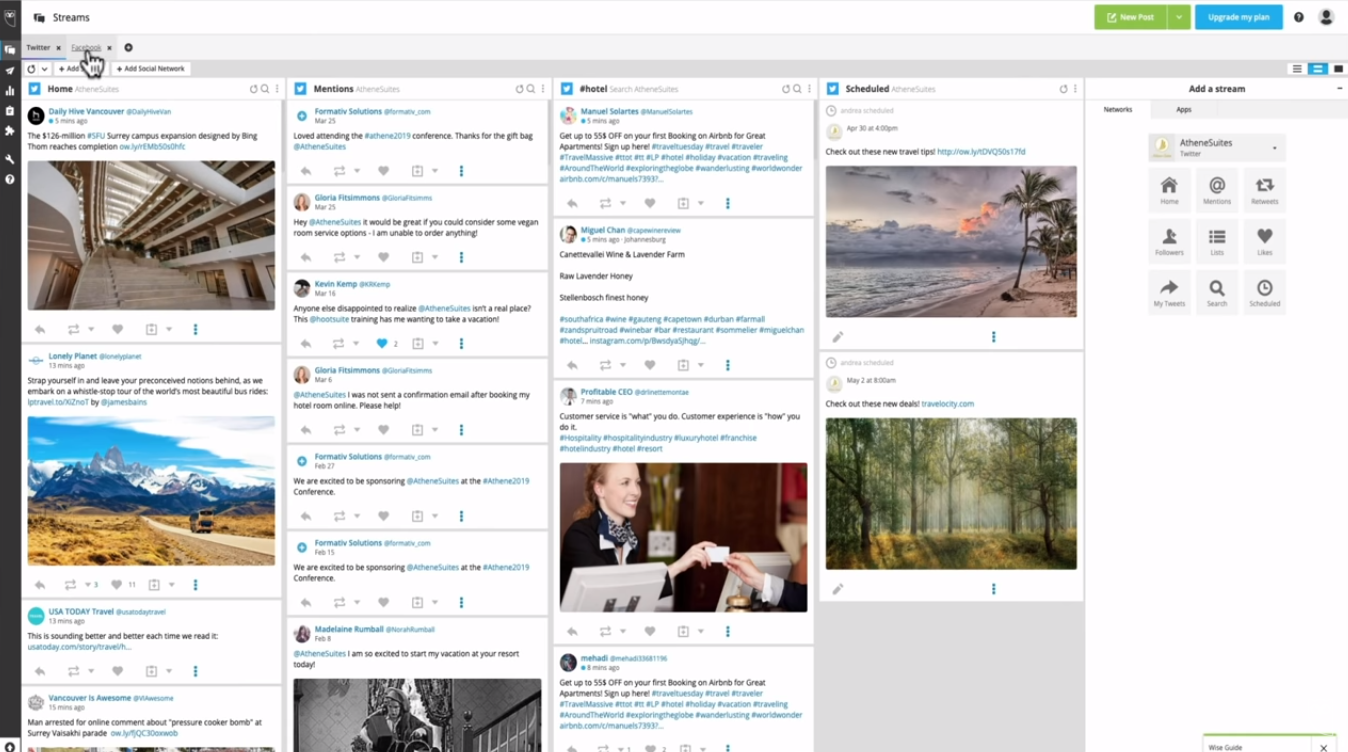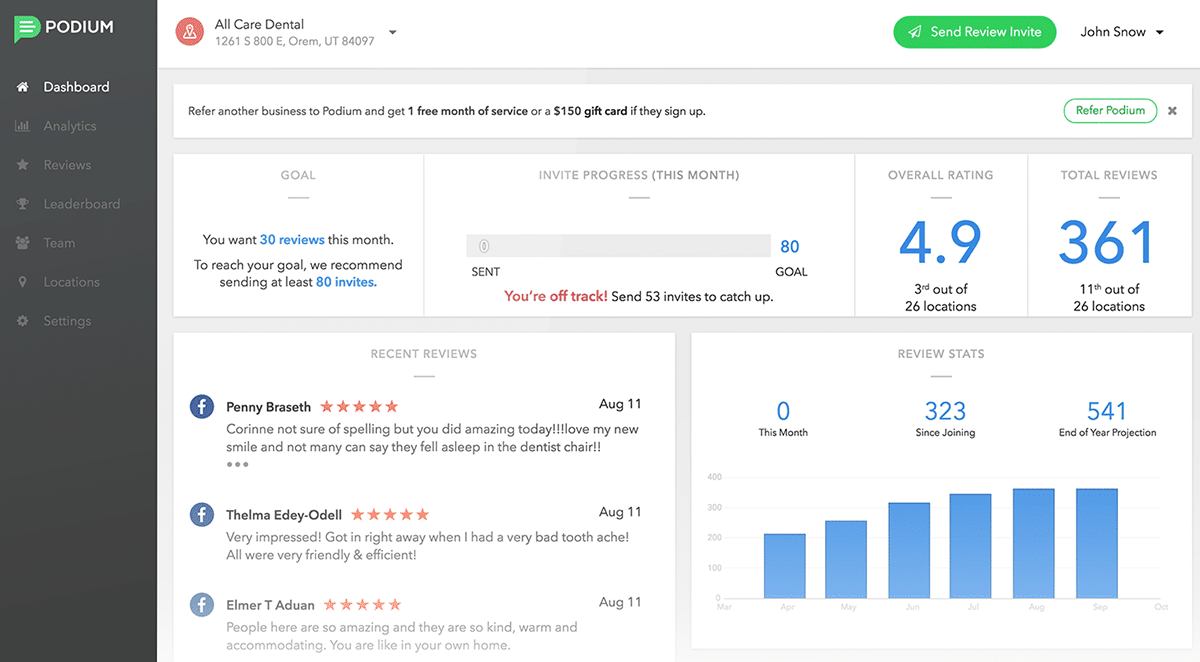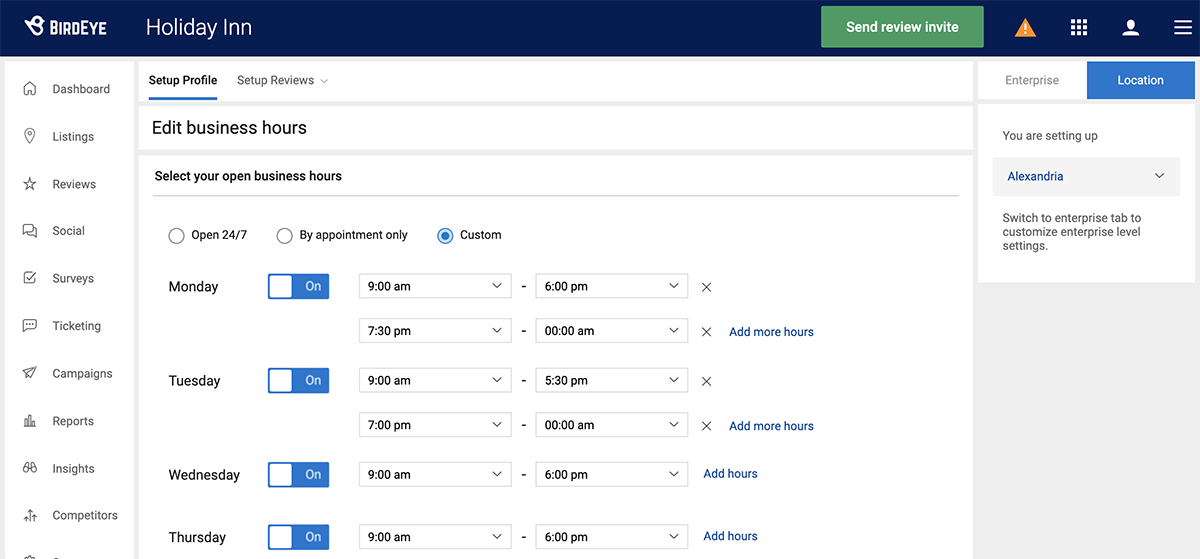Whenever a negative comment is posted about your products or services on Facebook, Twitter, Yelp, and the like, it can reach hundreds, thousands, if not more current or potential customers. If they see a negative review, their perception of your business is likely to be colored. Ultimately, they won’t even consider your brand.
That could hurt your business, so what you need to do is mitigate the situation before it blows up. But how are you supposed to do that? You can set up alerts for mentions and comments for every channel you want to watch. That is not very efficient, however, and this kind of net may not be able to catch all negative feedback.
For a better user review monitoring capability, you need a reputation management software. It can crawl the web for mentions of your company. So, whenever there is a new one on the web, it notifies you. If it is a negative post, you can quickly resolve the issue and make the customer happy. If it is a positive one, you can amplify it. That is why we prepared this primer: to help you get acquainted with the features and benefits of reputation management software solution. We’ll also throw in some examples to get you more acquainted with these products.
What is Reputation Management Software?
Reputation management software enables companies to determine the public’s opinion of their brands. It does this by tracking user reviews on social media platforms as well as review sites. It can do this automatically, too, so you do not have to crawl the web by yourself. This way, you can find unhappy customers easily and resolve the issues they encountered, thus, transforming their bad experience into a more memorable one. What’s more, this software solution assists you in getting reviews from users or clients. Because of this, you can show more of the good feedback on your website, social network pages, and review sites.
List of Best Reputation Management Software
It can be difficult to find the right one because there are so many so we are helping you by narrowing down the list:
- Podium: This platform maximizes your current systems to elevate your customer engagement. It helps you expose your business to a wider audience in search engines as well.
- Hootsuite: This well-known app can help you with your marketing campaigns across different social media platforms. You can also use this to manage your online reputation because you can easily see when people mention or tag your brand.
- Yotpo: This prominent solution gathers feedback from users and allows companies to use the best ones to promote their brand. It also offers an embed function that lets you share reviews on your site.
- Birdeye: It analyzes reviews from different channels for insights that pave the way to intelligent decision-making regarding the transformation of the brand or of the customer service.
- Reputation.com: This platform helps you revolutionize customer experience while keeping in mind the needs of users.
- Thryv: Getting new customers and repeat business is possible with Thryv. This robust platform provides you with CRM tools, an appointment booking module, an online presence manager, and a dedicated reputation management solution.
- Broadly: Get more positive reviews from your customers to gain better visibility and additional business. The process is automated so consumers will be interested in leaving feedback.
- ReviewTrackers: This award-winning solution allows you to get more reviews from your clientele. Through this, you can gain insights regarding your customer service for you to improve your operations.
- Yext: You can integrate this platform into your digital presence system to drive more customers to your business locations.
- ConsumerAffairs.com: Using this platform, you can keep tabs on goings-on regarding consumer affairs. This way, you can ensure the safety of your consumers and also alert them into new technologies or strategies that can enhance their lifestyles.
How does Reputation Management Software work?
Tracks User Feedback
A reputation management solution allows you to track user reviews across the internet. This means that whether customers voiced their opinions or shared their experiences on social media sites, on user review aggregators, or on your website, you will be notified immediately.
Gathers Customer Reviews
With a reputation management application, you can do away with asking customers to fill up paper survey forms. Instead, you can solicit reviews via email or a messaging platform. This way, they can post their review on their own time. This also aids you in gatekeeping and resolving the concerns of unhappy clients.
Analyzes Overall Feedback
What do customers think about you in general? Instead of tallying survey responses and creating charts, you can generate reports in one click using a reputation management solution.

Hootsuite dashboard shows you updates on all of your social media accounts. You can track your feed, or you can track mentions, replies, and messages.
Who is Reputation Management Software for?
Reputation Management Software is created for all organizations and is great for service establishments as well.
- Any-size organization. Businesses in any industry can use a reputation management application to prevent their reputations from being tarnished.
- Service establishments. Restaurants, bars, diners, hotels, inns, and the like can benefit from this solution. With this, they can improve their foods and drinks as well as their services.
What are the types of Reputation Management Software?
- Social Media Monitor. Social media sites are huge. Facebook alone has over 2.5 million monthly active users. They can be your audience but that number can also work against you. This is why you need a reputation management software that crawls social media platforms for mention of your company name. With this, you can be alerted to new reviews, which can be detrimental to your reputation.
- Review Aggregator Monitor. This type usually looks at review aggregating sites where users can share their feedback. It can also look at other places on the internet like blogs and vlogs.
- Combination. Nowadays, it is common for a reputation management software to look at social media sites, review sites, and other sections of the web.

Podium can help customers find your business.
What features can you expect from a Reputation Management Software?
- Real-time Alerts. Because reputation management software are always on, you will know that there is a new review of your products or services as soon as it is posted.
- Feedback Gathering Tools. You can solicit reviews from your customers by sending them a canned email or a link to an online survey form.
- Escalation Features. If the customer service representative’s efforts are not enough to satisfy the client, the user can escalate the matter to the manager or to other higher-ups.
- Integrations. You may need to reply to comments, messages, and mentions directly so it helps if your reputation management solution can integrate with social networking platforms.
- Reports. You can find out how your company is doing according to public opinion by generating ad-hoc reports or by getting them as scheduled.
What are the latest trends in Reputation Management Software?
- Search engine control is an effect of reputation management. Because positive comments are boosted, negative reviews are pushed farther out into the search results. With this, your company can be a part of the buyer’s journey in its crucial stage: the decision-making stage.
- Demand is rising for reputation management solutions. Companies feel the need for them as even a single comment on the internet can deliver a huge blow to their reputations.
What are the benefits of Reputation Management Software?
- Engaged customers. Customers are more likely to share bad experiences on the internet rather than good ones. If you engage them, you can stop the spread of negative reviews and transform their experiences into good ones.
- Competitor monitoring. Are your target users talking about your competitors? You can find out what they think and leverage your product as a better alternative.
- Public relations. You need to be strategic in your communications and a reputation management solution can help you build a good relationship with the public.
- Influencer identification. There are members of the public who have huge sway over public opinion regarding products and services. With a software, you can identify them and collaborate with them to elevate your brand.
- Develop for niche markets. There may be a section of the market that is not being catered to well or not at all. This kind of solution can help you figure out what these sections are and what they need so you can get ahead of the competition.

You can add daily business hours to your review profile.
Are there issues that you can encounter with Reputation Management Software?
- It is difficult to use. Most software today are designed with ease of use in mind. Regardless, there are platforms that are simply difficult to get the hang of. Reputation management software are one of them. Its tools and features can be convoluted at first and require time and dedication to harness.
- It is a barrier to personalized exchanges. With a reputation management solution, you can immediately reply to comments and online messages. However, such exchanges are impersonal. This may be a barricade to better interactions with your customers.
What should you consider when choosing a Reputation Management Software?
For a reputation management application to work for you, you have to outline some things first before you go shopping and settle on one:
- Target audience and channels. Who exactly is your target audience? Once you figure that out, you can have a better idea of where they might hang around on the internet.
- Functionalities. What features are you interested in? Platforms vary in their offerings and if you choose the one that does not have the capabilities you are looking for, you could be wasting an investment.
- Customer service. Can the vendor help you when you need them? That is something you have to think about, as you never know when you might encounter technical issues.
Do your reaserch
Learning about the ins and outs of the platform you are considering is essential. Because while there are solutions that offer month-to-month subscriptions, it may not be a good idea to change vendors often. That is why you need to get a feel of the software before committing to it even for a year.
